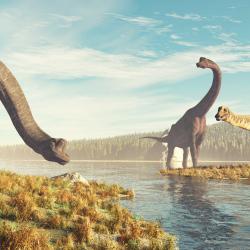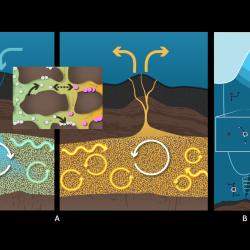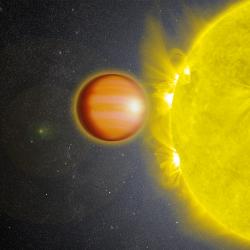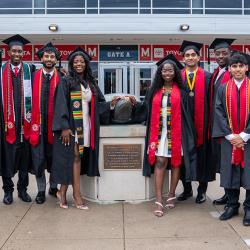NASA Awards UMD-led Team $7.3 Million to Study Moons of Earth and Mars, Nearby Asteroids
UMD team is one of eight selected to participate in NASA’s SSERVI program
NASA has selected eight new research teams—including one based at the University of Maryland—as part of the Solar System Exploration Research Virtual Institute (SSERVI). The eight teams will join four existing SSERVI teams to collaborate on research at the intersection of space science and human exploration.
 Geophysical Exploration Of the Dynamics and Evolution of the Solar System (GEODES) will be led by Nicholas Schmerr, an assistant professor of geology at UMD. The team, which includes a total of 10 researchers from UMD’s Departments of Geology and Astronomy, will use field studies here on Earth to test protocols for characterizing the evolution, stability, and safety of surfaces on the moon, near-Earth asteroids, and Mars’ moons Phobos and Deimos.
Geophysical Exploration Of the Dynamics and Evolution of the Solar System (GEODES) will be led by Nicholas Schmerr, an assistant professor of geology at UMD. The team, which includes a total of 10 researchers from UMD’s Departments of Geology and Astronomy, will use field studies here on Earth to test protocols for characterizing the evolution, stability, and safety of surfaces on the moon, near-Earth asteroids, and Mars’ moons Phobos and Deimos.
“We’re the first SSERVI team to focus on geophysics, so we’re in a unique position to help make planetary geophysics a priority for new explorations,” Schmerr said. “We’ll be using analogs here on Earth to help prepare for future missions to environments where astronauts might find ice deposits; caves and lava tubes; and deep layers of dust, gravel and sand. We’re really excited to contribute to the exploration of the solar system.”
The GEODES team will conduct their work at a variety of field sites in the western U.S., including Lava Beds National Monument in northeastern California, the San Francisco Volcanic Field in northern Arizona and the East Snake River Plain in southern Idaho. These sites are home to landscapes and geological features that resemble other rocky bodies in our solar system. Astronauts on future missions to nearby moons and asteroids will need a detailed geological understanding of these foreign worlds to build structures, mine resources and ensure their own safety.
SSERVI will support the eight new teams for five years, at a combined total of about $10.5 million per year. The winners were selected via peer review from a pool of 24 competitive proposals received from the planetary science and human exploration communities. Work will take place in cooperation with U.S and international partners.
The GEODES team will receive a total of $7.3 million over the course of the five-year award period. UMD’s partners include NASA’s Goddard Space Flight Center, the Planetary Science Institute, the University of South Florida, the Southwest Research Institute, John’s Hopkins University Applied Physics Laboratory, the U.S. Geological Survey, the University of Arizona, Northern Arizona University, and Samara/Eureka Data. A portion of the funding is earmarked to support several graduate students and postdoctoral researchers.
“The discoveries these teams make will be vital to our future exploration throughout the solar system with robots and humans,” said Lori Glaze, director of the Planetary Science Division in NASA's Science Mission Directorate in Washington.
Based and managed at NASA’s Ames Research Center, SSERVI was created in 2014 as an expansion of the NASA Lunar Science Institute. It supports scientific and human exploration research at potential future human exploration destinations under the guiding philosophy that exploration and science enable each other. SSERVI members include academic institutions, nonprofit research institutes, commercial companies, NASA centers and other government laboratories.
“We are extremely pleased that the community responded with such high-quality proposals and look forward to the many contributions new SSERVI team members will make in addressing NASA’s science and exploration goals,” said Greg Schmidt, the SSERVI director at NASA Ames.
In addition to Schmerr, project participants from UMD’s Department of Geology include Faculty Specialist Todd Karwoski, Associate Professor Vedran Lekic, Professor Laurent Montesi and Professor Wenlu Zhu. From UMD’s Department of Astronomy, Postdoctoral Associate Jacob Richardson will serve as co-principal investigator on the project, with participation from Professor Derek Richardson, Professor Jessica Sunshine, Faculty Specialist Nicole Whelley and Visiting Assistant Research Scientist Patrick Whelley.
###
Media Relations Contacts: Matthew Wright, 301-405-9267, mewright@umd.edu
University of Maryland
College of Computer, Mathematical, and Natural Sciences
2300 Symons Hall
College Park, MD 20742
www.cmns.umd.edu
@UMDscience
About the College of Computer, Mathematical, and Natural Sciences
The College of Computer, Mathematical, and Natural Sciences at the University of Maryland educates more than 9,000 future scientific leaders in its undergraduate and graduate programs each year. The college's 10 departments and more than a dozen interdisciplinary research centers foster scientific discovery with annual sponsored research funding exceeding $175 million.







